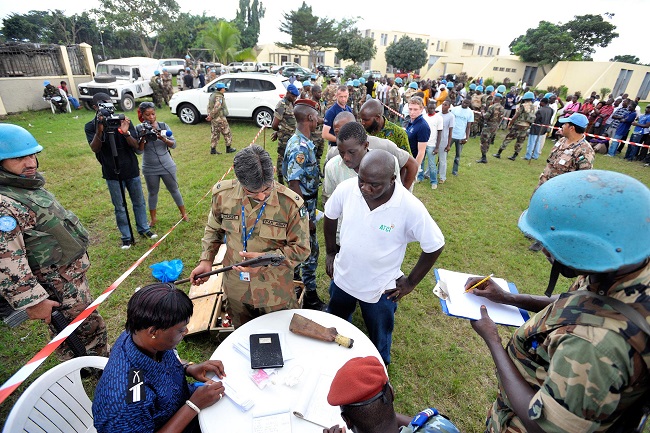UN wraps up peacekeeping operation in Ivory Coast

UNOCI officers conduct a disarmament, demobilization and reintegration operation with ex-combatants in the Abobo area of Abidjan in February 2012. UN Photo/Hien Macline
After 13 years, the United Nations is wrapping up the peacekeeping phase of its engagement with Ivory Coast (Cote d’Ivoire), after helping the country restore peace and stability following the post-2010 election crisis.
When the UN Operation in Côte d’Ivoire (UNOCI) closes its doors on June 30 this year, it will mark the most recent successful completion of a peacekeeping operation in West Africa since the UN mission in Sierra Leone in 2005.
This milestone was made possible thanks to a significantly improved security situation in Côte d’Ivoire, as well as the extension of state authority, deployment of public services, strengthening of democratic institutions, progress in security sector reform and steady economic development.
Headed most recently by the Secretary-General’s Special Representative, Aïchatou Mindaoudou, the civilian and military personnel of UNOCI played a critical role in the country. This saw UN personnel involved in protecting civilians, monitoring the ceasefire, assisting government with disarmament, demobilisation and reintegration of former combatants and countering hate messages on the airwaves with UNOCI FM.
UNOCI is in the process of delegating critical tasks necessary to ensure sustainability of gains achieved so far to the UN country team that follows it.
In 2004 the country was divided by civil war. A lack of state authority saw the Security Council adopt resolution 1528, establishing UNOCI for an initial 12 month period. One of the mission’s initial tasks was to monitor and support a peace agreement signed by the Ivorian parties the previous year.
Another primary duty was to monitor the Zone of Confidence – a swathe of land separating government-ruled south and opposition-controlled north – while restoring trust between the parties to reunite the country.
In 2007, under the Ouagadougou Political Agreement, UNOCI set up 17 observation posts called the “Green Line” – replacing the Zone of Confidence – that remained in place until July 2008, when the last post was removed.
UNOCI responded to numerous challenges during its existence.
In January 2006, pro-government youth protesters took to the streets after a UN authorised team supported terminating parliament, whose mandate had expired.
After four days of violent protests which saw UN humanitarian and peacekeeping facilities targeted hundreds of UN personnel were evacuated.
The Security Council then decided to boost UNOCI’s strength with the temporary deployment of an additional battalion from the UN mission in Liberia.
In 2010, the country was thrust back into civil war when incumbent president Laurent Gbagbo refused to step down after losing the UN-certified election to Alassane Ouattara. Throughout a period of increased fighting, UNOCI continued to protect civilians, even as it was itself being targeted.
Gbagbo eventually surrendered and Ouattara was inaugurated as president in May 2011, but not before about three thousand people were killed in post-election violence and another 300 000 became refugees.
UNOCI facilitated an inclusive political dialogue, culminating in presidential and legislative elections in 2011 and 2016 and a referendum. Among other achievements, the mission strengthened the National Commission on Human Rights, which helped decrease human rights violations and assisted in disarming 70 000 combatants and reintegrating them into society.
Defence Web

